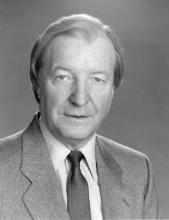Charles J. Haughey 1979 - 1992:
Charles Haughey became leader of Fianna Fáil and Taoiseach in late 1979. A son-in-law of former Taoiseach Seán Lemass, Charles Haughey was appointed Parliamentary Secretary in Justice, 1960-61, Minister for Justice, 1961-64, Minister for Agriculture and Fisheries, 1964-66 and Minister for Finance, 1966-70. He effectively abolished the death penalty in 1963. Haughey introduced the Succession Bill in 1964 which removed discrimination against women in inheritance rights. As Minister for Finance he introduced free electricity and free transport for old age pensioners.
He was removed by Jack Lynch from the cabinet in 1970 during the upheavals over northern policy but came back as Minister for Health and Social Welfare in 1977, and took over as leader of Fianna Fáil and Taoiseach when Jack Lynch resigned in 1979. Charlie Haughey appointed Máire Geoghegan Quinn to his cabinet, the first woman cabinet minister since Constance Markievicz. He co-established the Anglo-Irish framework to explore the totality of relationships between Ireland and Britain. Charlie Haughey was a patron of the arts, establishing Aosdána, giving tax exemptions to creative writers and artists, and removing VAT from books.
He served as Taoiseach for four periods -1979 until 1981, in 1982 and again from 1987-89 and 1989-92. The Haughey years were full of drama - despite various distractions there were achievements. He established the Irish Financial Services Centre (IFSC); saved Temple Bar and turned it into a tourist and cultural quarter and set up the National Treasury Management Agency. In 1990 under his leadership Ireland enjoyed a very successful European Presidency at the time of German re-unification. Haughey opened the new Government Buildings in 1991.
Under Charlie Haughey’s leadership, Fianna Fáil entered coalition government for the first time with the Progressive Democrats in 1989.
Former Party Leaders & Taoisigh:

